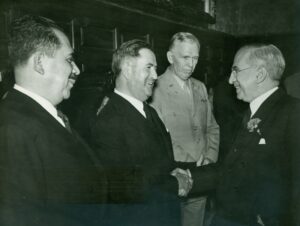
Left to Right: General Cardenas, President Avila Camacho, General Marshall, Ambassador Messersmith.
Can you name all of the countries that were part of the Allied Nations during World War II? Did you include Mexico on your list? Many people, myself included, may be surprised to learn that Mexico participated in World War II. In response to the sinking of several oil ships by German U-boats, Mexico declared war on the Axis Powers on May 22, 1942. George C. Marshall, who recognized the vital importance of having other countries in the western hemisphere, particularly those neighboring the United States join the Allied war effort, was likely pleased when he received this news.
Although Mexico had joined the Allies more than a year earlier, Marshall visited Mexico City on September 15-16, 1943, as a guest for the celebration of the 133rd anniversary of Mexico’s independence. When providing a report of his visit to President Roosevelt, Marshall mentions that the President General Manuel Avila Camacho of Mexico wanted Roosevelt to know, “…that whenever the services of the Mexica military forces were required in the common cause they would be made available.” On July 26, 1944, Marshall sent a message to William D. Leahy informing him of, “Approximately 300 Mexican officers… in transit to San Antonio for the purpose of undergoing unit training for a Mexican Fighter Squadron.” After their training was completed, the unit arrived in the Philippines on May 1, 1945 and became part of the 5th Air Force.

Marshall’s scrapbook of his trip to Mexico
Even before George C. Marshall began his assignment as Chief of Staff of the United States Army, he traveled to Brazil. Several months prior to Marshall’s visit he wrote to Major General John L. DeWitt requesting that, “a complete strategic survey of Brazil to include a detailed consideration of the most effective military operations that the United States could undertake should it become necessary to assist that country in the maintenance of its independence…” Brazil’s vast supply of natural resources, extensive coastline with several excellent harbors, and the ability of planes to fly nonstop across the Atlantic Ocean to Africa are a few of the factors that caused Marshall to value a strong relationship with Brazil so highly. By strengthening ties with Brazil, Marshall also hoped to prevent a potential global conflict from expanding into the western hemisphere, which could also threaten United States access to the Panama Canal. Marshall’s successful goodwill tour to Brazil effectively undermined Germany’s attempts to win Brazil as an ally and was of vital importance to the United States throughout World War II.
Although the contributions of Mexico, Brazil, and other smaller countries supporting the Allies may not be well known, they were vitally important to helping the Allies achieve victory.
